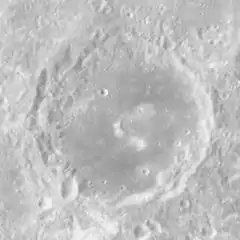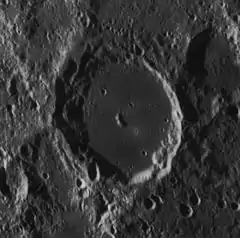Hubble (crater)
Hubble is a lunar impact crater that lies very near the east-northeastern limb of the Moon. At this location it is viewed almost from the side from Earth, and the visibility of this feature is affected by libration. It lies to the north of the Mare Marginis and northeast of the crater Cannon. About one crater diameter to the north-northeast is Lyapunov.
 Apollo 16 image | |
| Coordinates | 22.1°N 86.9°E |
|---|---|
| Diameter | 81 km |
| Depth | Unknown |
| Colongitude | 275° at sunrise |
| Eponym | Edwin P. Hubble |

The rim of this crater is worn and eroded, and it has a somewhat irregular edge in places. The inner wall is wider along the western side, where the rim has a slight outward bulge. The most intact portion of the rim lies along the eastern side, and the inner wall of this face is visible from the Earth.
The interior floor has been resurfaced by basaltic lava, giving it a lower albedo than the surrounding terrain. It is, however, not quite as dark as the lunar mare to the south. This surface is relatively level and featureless, with only a few tiny craterlets. It lacks a central peak, but a pair of small craterlets lies near the midpoint.
Satellite craters
By convention these features are identified on lunar maps by placing the letter on the side of the crater midpoint that is closest to Hubble crater.
| Hubble | Latitude | Longitude | Diameter |
|---|---|---|---|
| C | 19.27° N | 85.37° E | 53.64 km |
See also
References
- Andersson, L. E.; Whitaker, E. A. (1982). NASA Catalogue of Lunar Nomenclature. NASA RP-1097.CS1 maint: ref=harv (link)
- Blue, Jennifer (July 25, 2007). "Gazetteer of Planetary Nomenclature". USGS. Retrieved 2007-08-05.CS1 maint: ref=harv (link)
- Bussey, B.; Spudis, P. (2004). The Clementine Atlas of the Moon. New York: Cambridge University Press. ISBN 978-0-521-81528-4.CS1 maint: ref=harv (link)
- Cocks, Elijah E.; Cocks, Josiah C. (1995). Who's Who on the Moon: A Biographical Dictionary of Lunar Nomenclature. Tudor Publishers. ISBN 978-0-936389-27-1.CS1 maint: ref=harv (link)
- McDowell, Jonathan (July 15, 2007). "Lunar Nomenclature". Jonathan's Space Report. Retrieved 2007-10-24.CS1 maint: ref=harv (link)
- Menzel, D. H.; Minnaert, M.; Levin, B.; Dollfus, A.; Bell, B. (1971). "Report on Lunar Nomenclature by the Working Group of Commission 17 of the IAU". Space Science Reviews. 12 (2): 136–186. Bibcode:1971SSRv...12..136M. doi:10.1007/BF00171763.CS1 maint: ref=harv (link)
- Moore, Patrick (2001). On the Moon. Sterling Publishing Co. ISBN 978-0-304-35469-6.CS1 maint: ref=harv (link)
- Price, Fred W. (1988). The Moon Observer's Handbook. Cambridge University Press. ISBN 978-0-521-33500-3.CS1 maint: ref=harv (link)
- Rükl, Antonín (1990). Atlas of the Moon. Kalmbach Books. ISBN 978-0-913135-17-4.CS1 maint: ref=harv (link)
- Webb, Rev. T. W. (1962). Celestial Objects for Common Telescopes (6th revised ed.). Dover. ISBN 978-0-486-20917-3.CS1 maint: ref=harv (link)
- Whitaker, Ewen A. (1999). Mapping and Naming the Moon. Cambridge University Press. ISBN 978-0-521-62248-6.CS1 maint: ref=harv (link)
- Wlasuk, Peter T. (2000). Observing the Moon. Springer. ISBN 978-1-85233-193-1.CS1 maint: ref=harv (link)